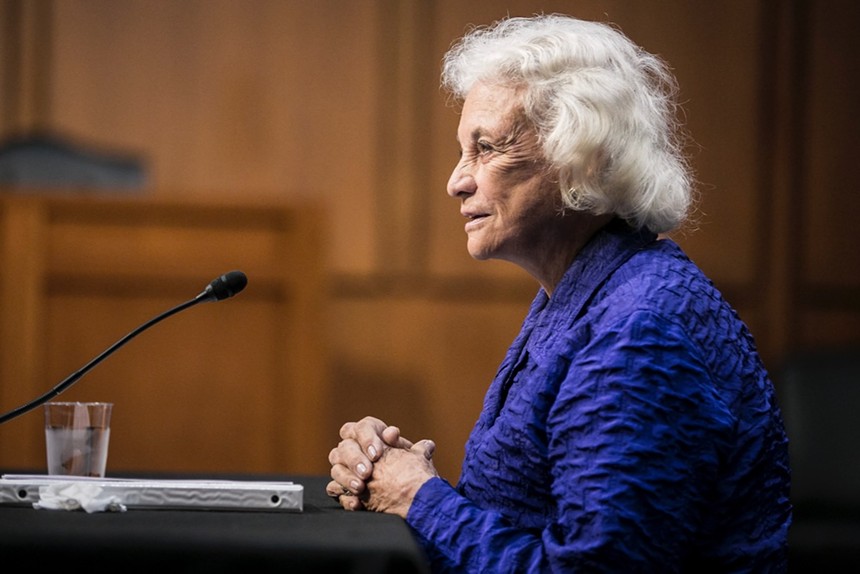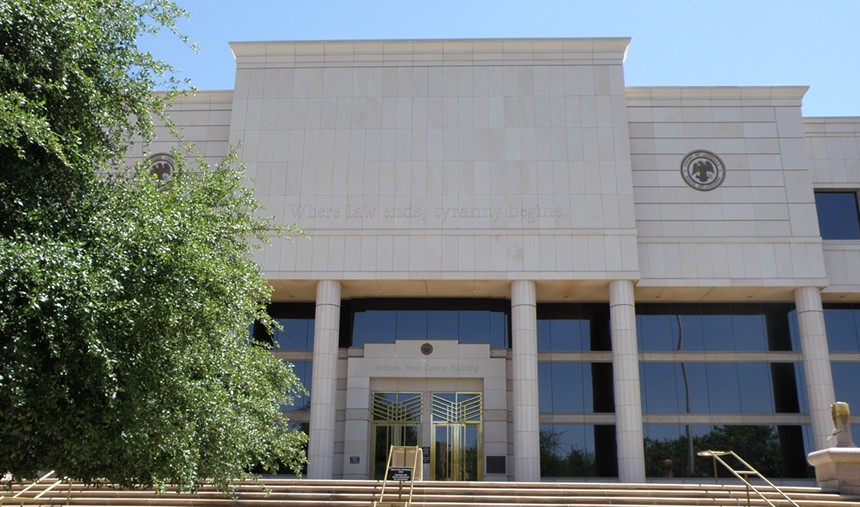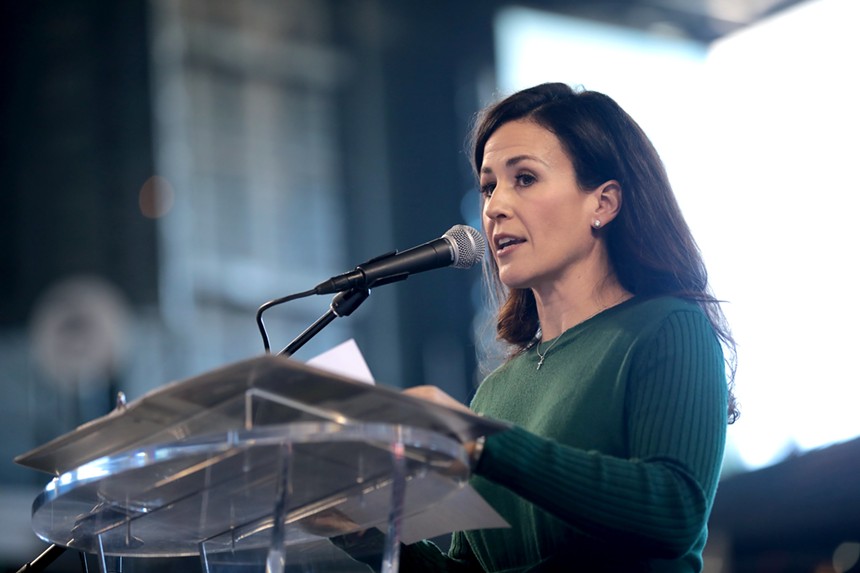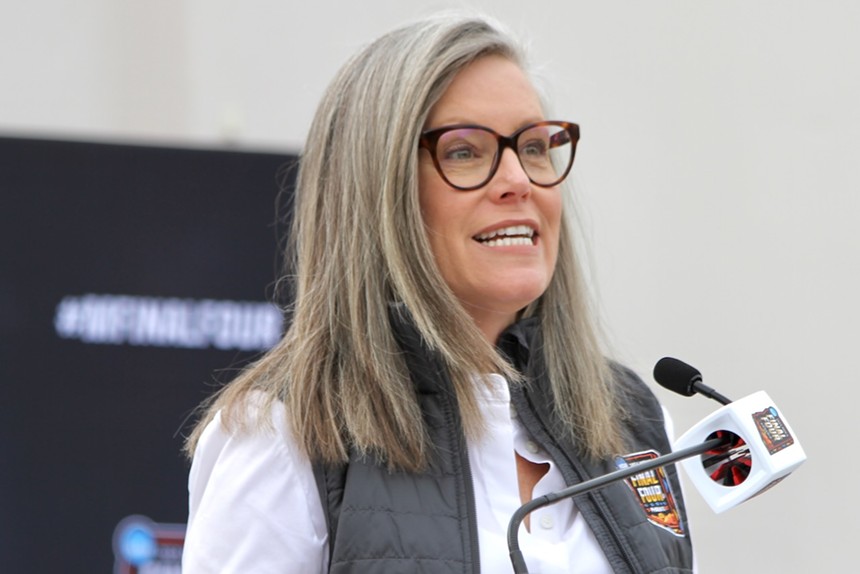As civil rights groups zero in on Arizona courts as a key battleground, Republicans have placed a measure on the November ballot that would eliminate retention elections for judges, shielding conservatives’ control over the state Supreme Court by ending voters’ ability to remove justices.
The Arizona GOP put Proposition 137 on the ballot in June, amid widespread outrage over the Supreme Court’s April decision to uphold a Civil War-era abortion ban. Within weeks of that ruling, the progressive group Progress Arizona launched a campaign to unseat two of the justices who sided with the majority and are up for retention this fall, Clint Bolick and Kathryn King, providing an outlet for voters put off by the decision and the court’s ideological makeup.
Proposition 137, if it passes on Nov. 5, would nullify Bolick and King’s retention races that are taking place on the same day, as well as cancel future elections.
The proposal is “a power grab,” said Abigail Jackson, digital director of Progress Arizona. “This was responding to the energy and the anger we saw around that decision. The extremist legislators who pushed the proposal forward did it with the intention of protecting these judges.”
She added, “It is designed to take away our voices.”
Jake Faleschini, program director for the Alliance for Justice, a national organization that works to build progressive strength in the judiciary, points to a string of changes the GOP has pushed nationwide to consolidate power in state courts. Over the last decade in Arizona, Republicans expanded the state Supreme Court and secured a strong conservative majority.
“At the end of the day, they want policy outcomes from the courts and they are willing to change the rules to achieve that,” Faleschini told Bolts.
“What we are seeing now is a bit of an awakening from the left around just how important these courts are for maintaining our rights,” he said. “As these rights have been taken away by the (U.S.) Supreme Court, some of the state supreme courts are no longer there as willing participants in proactively protecting their rights.”
Supporters of Prop. 137 say it is designed to insulate judges from such blowback against their rulings so they don’t have to pander to win votes. Republican Senator David Gowan, one of the measure’s chief sponsors, says he’s worried about national groups flooding state elections.
“This proposition makes it difficult for nefarious outsiders to manipulate our judicial process,” Gowan told Bolts. “We see a lot of dollars pour in from out of state to unseat judges who can’t defend themselves because they aren’t politicians.”
Gowan, a conservative who used to be state Speaker, has a history of proposals that would override election results. He proposed a bill in 2021 to allow lawmakers to attribute Arizona’s electoral votes to whichever presidential candidate they choose, regardless of how people vote.

After her retirement from the U.S. Supreme Court, Sandra Day O'Connor worked to bring Arizona's judicial retention system to other states.
T.J. Kirkpatrick / Getty
How judicial retention works
This year’s Prop. 137 would cancel retention elections for Supreme Court justices, judges on the state’s Court of Appeals and superior court judges in counties above 250,000 residents.Currently, all judges first make it on the court through an appointment by the governor, though the state has some guardrails for whom governors can choose: Governors must select their nominee from a shortlist of candidates assembled by a 16-member panel, though that panel’s members are also chosen by the governor.
Once judges are on the court, they face regular performance reviews, as well as retention elections every four to six years that give the public some say; these races are "up-or-down" questions, in which Arizona judges never face an opponent. As long as they win these retention tests, judges can stay on the court — up until the mandatory retirement age of 70.
The system was approved by Arizona voters in 1974, with support from Sandra Day O’Connor, who at the time was a Republican state senator. After she retired from the U.S. Supreme Court in 2006, O’Connor worked to bring Arizona’s system to other states.
This year, the Arizona Judges Association, a professional organization that represents hundreds of judges, advocated for the measure to end retention elections. Jonathan Paton, a former GOP lawmaker who lobbies on behalf of the AJA, told lawmakers that scrapping retention elections would improve accountability because it’s too difficult for voters to make informed decisions on judges.
“I represent the Judges Association, and I don’t know who most of these people are that appear on the ballot,” Paton testified in the legislature. “So, do we think that the average voter knows?”
Paton is married to Court of Appeals Judge Angela Paton, who is also up for retention this fall and has been targeted by a progressive group. If Prop. 137 passes, it would also nullify the results of her election.
But many Arizona jurists don’t want the public to be cut out of the process of deciding who runs the courts, and the debate over Prop. 137 created large rifts within the legal community.
Retired Chief Justice Ruth McGregor, a former president of the Arizona Judges Association, spoke against Prop. 137 at the launch event of Keep Courts Accountable, a political action committee formed in August to convince voters to reject the amendment. Former Chief Justice Scott Bales and former Justice John Pelander spoke at the event as well.
Reached for comment, Paton would not say whether the Arizona Judges Association still backs the reform. The association’s website was taken offline in the last month. Paton also told Bolts that, as a lobbyist for judges, he cannot reply to questions about an active ballot measure.
“Without the vote of the people, the judges would have no accountability,” Felicia Rotellini, who chairs the Keep Courts Accountable PAC, told Bolts. “If there is no accountability to the people, then there is a motivation to lean towards their own ideological preferences, their personal preferences, their political preferences.”
“We will lose part of our democracy,” said Rotellini, who is also a former head of the state Democratic Party.

If passed, Proposition 137 could severely limit the ability of citizens to recall judges in Arizona.
Kevin Bondelli/Flickr/CC BY-NC-SA 2.0
Cutting voters out
Arizona is among the 31 states that hold elections for their justices. Ending that practice would make it an outlier in the West, where many states adopted judicial elections during the Progressive Era as part of a broader wave to end corruption and cronyism. The 19 states that have no judicial elections are heavily concentrated in the northeast of the country.In Arizona, a commission of laypeople and legal experts periodically reviews judges’ performance to determine if they meet the standards for the bench, based on surveys collected from attorneys, fellow judges and people who have appeared before them in court. The scores are shared with voters before each election to help voters decide whether to keep them based on standards of merit, such as legal ability and integrity, rather than political issues.
If Prop. 137 is approved, judges would only go before the voters if they fail their performance review, a rarity in Arizona, or if they are convicted of certain crimes, declare bankruptcy or foreclose upon a mortgage. Gowan is making the case that this reform would help voters make decisions that are a lot more informed.
“The judicial retention portion of the ballot, that’s two pages long,” he said. “If we take the high-performing judges off the ballot, it allows the people to see the low-performing judges, and they are no longer able to hide in the crowd, because those are the ones we want to knock out.”
But Prop. 137 would also modify the performance review process by injecting legislators into it: The majority party in each chamber would appoint a member to the otherwise nonpartisan commission charged with assessing judges for impartiality, temperament and expertise.
According to Bales, the former chief justice who spoke at the launch of the PAC that opposes Prop. 137, the change would “make judges more susceptible to criticisms from the legislature, and perhaps a little less susceptible to the kind of public input you get through the (election process).”
Prop. 137 would also give legislators authority to order investigations against judges suspected of “a pattern of malfeasance,” though the proposal does not define what activities would warrant such an inquiry.
Bates worries this would empower legislators to attack judges they disagree with. “What I think this really is, is a blank check for any individual legislator who has a grievance against a judge or wants to get some political mileage out of asserting a grievance against a judge,” he said.

Arizona Supreme Court Justice Kathryn King faces a retention election this fall.
Gage Skidmore/Flickr/CC BY-SA 2.0
Weaponizing retention?
The effort to end judicial terms in Arizona comes as reformers at the federal level are pushing for the inverse change of rolling back lifetime judicial appointments. Following revelations that U.S. Justices Clarence Thomas and Samuel Alito accepted millions of dollars in undisclosed gifts from individuals with cases before the court, groups like Alliance for Justice are making the case that federal judges are not accountable enough and that the federal system needs stronger guardrails, such as term limits and an enforceable code of ethics.If Prop. 137 passes, Arizona judges would look a lot more like the federal bench, Falschini said. They “would have zero accountability to the people, just like federal judges.”
Bolick, one of the two justices up for retention this fall, published an opinion article in May in the Arizona Republic, arguing that it’s the campaign to oust him that’s responsible for politicizing the judiciary and diluting the state’s emphasis on merit.
Progressives, he wrote, are “weaponizing judicial retention” and “cynically harnessing anger over our recent abortion decision to replace us with justices who will rubber-stamp their ideological agenda.”
The latest efforts over Bolick’s reelection and Prop. 137 are an escalation of fights that took off last decade. Republicans, led by former Governor Doug Ducey, changed the norms around court appointments, helping ensure courts would lean conservative. Their maneuvers allowed Ducey to appoint five of the seven justices currently sitting on the all-Republican court.
In 2016, Republicans expanded the state Supreme Court by adding two seats, enabling Ducey to appoint two new judges despite unanimous opposition from sitting justices.
Then, in 2019, Ducey upended the nominating commission to ensure he’d be able to nominate his preferred candidate. Earlier that year, the commission had refused to include Bill Montgomery, Maricopa County’s conservative prosecutor, on its shortlist for a judicial vacancy. Ducey then replaced some of the commission’s members, paving the way for the new panel to recommend Montgomery and for the governor to place him on the Supreme Court.
Although no Arizona justice has ever lost a retention race, progressives in 2022 mounted an unusually solid effort to oust Montgomery, questioning his ideology and ethics. The justice also received relatively low performance scores in his evaluations, but was ultimately retained.
But in Maricopa County, the largest county in the state, voters chose to not to retain three local judges, an unusual result. One of the ousted judges, Stephen Hopkins, was the only judge that year to fail to meet the performance standards of the review process.

Gov. Katie Hobbs will get to appoint her first state Supreme Court justice after the retirement of Justice Robert Brutinel — and could appoint two more if voters recall justices Kathryn King and Clint Bolick and reject Proposition 137 at the ballot.
Matt Hennie
Much at stake
In March of this year, GOP lawmakers passed a resolution to end judicial elections through the state Senate; that was right before the Supreme Court’s decision on abortion. The House took up the bill months later, amid the surge of pro-choice activism against Bolick and King. The vote to advance the measure was strictly along party lines in both chambers, with all Republicans supporting it.State Senator Shawnna Bolick, a Republican who is married to Clint Bolick, voted in favor of the resolution that would end her spouse’s future elections.
Democrats in 2022 also flipped the governor’s mansion, and this November they have a shot at gaining the legislature and controlling the state’s government for the first time since the 1960s.
Republicans have reacted with frustration as they’ve lost their advantage in the state, and have pursued other steps to use this year’s ballot to limit the will of voters, including a measure to make it prohibitively difficult to qualify a citizen’s initiative. In Maricopa County, GOP candidates who have spread conspiracy theories that the 2020 election was stolen are trying to win control over the election systems.
And if voters pass Prop. 137 this fall, it would void the results of the concurrent retention races, including Bolick and King’s.
But if they reject the amendment while ousting one or both of Bolick or King, Democratic Gov. Katie Hobbs would have the power to nominate their replacements.
Regardless, Hobbs will soon get her first appointment to the court. Justice Robert Brutinel, who was appointed to the court by Republican Governor Jan Brewer in 2010 and who dissented in the court’s decision to revive the abortion ban, announced on Tuesday that he is retiring.
For Faleschini, Prop. 137 is about freezing the court’s conservative majority in place. “It’s not that they are looking for a change to the system to make it more fair and impartial,” he said. “They are seeking changes to make sure that the types of political justices they want on courts can stay.”
He added, “Republicans are concerned they will not win a statewide election again in a very long time. They think the only power they can hold onto is through the Supreme Court.”












